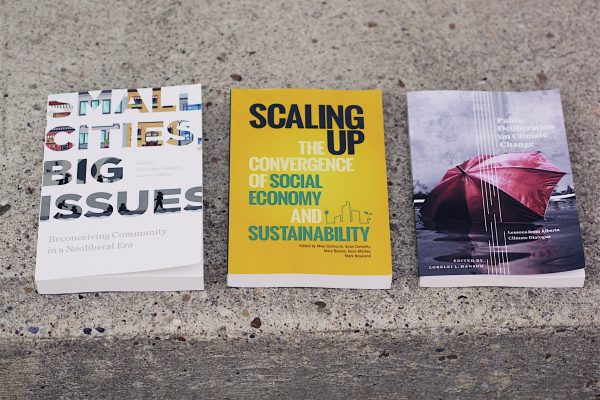Resources for City Officials and Informed Citizens
Living in an urban space means being part of a community, multiple communities, in fact. From your apartment building to your neighbourhood, and your place of work to your social network, you are contributing to and shaping a section of your city. One of the ways that your city shapes your community is through the infrastructure choices made by municipal governments. Because city infrastructure impacts your everyday life, it’s important for city officials and citizens to be in conversation with one another about the needs and goals of their communities. This can seem like a huge task, even in small cities, so where do we start? This question has been raised and addressed in several of our books this year, so we’ll turn to them for three steps on how to proceed.

- Identify the issues and determine root causes
Communities of all sizes face challenges both complex and sometimes intractable. In Small Cities, Big Issues, editors Christopher Walmsley and Terry Kading “call into question the myth of Canada as a fair and just society, guided by principles of compassion, by exploring the social realities facing small cities in Canada.” The contributors to this volume respond to this statement by investigating the responses of social planners and city officials to big issues such as homelessness, the sex trade, street addictions, poverty reduction, Indigenous–non-Indigenous relations, the integration of new immigrants, and the safety of the LGBTQ community. The responses to these issues are varied, ranging from community empowerment and progressive action to discrimination and social exclusion in the implementation of practices and policies. Based on these responses, the contributors reveal the distinctive attributes of the small city struggling to confront increasingly complex social issues. They argue that small cities can succeed in reconceiving community based on the ideals of acceptance, accommodation, and inclusion.
- Participate in public deliberation
Looking at the case studies in Small Cities, Big Issues, we can see that urban areas are under a significant amount of social and financial pressure. Lorelei Hanson and the contributors to Public Deliberation on Climate Change argue that public deliberation is one of the most effective tools for advancing conversations on difficult issues and informing decision makers about possible paths forward. Public Deliberation on Climate Change describes the public engagement process that influenced the City of Edmonton’s environmental strategic plan, The Way We Green. This book is a must-read for city officials or community leaders looking to resolve conflicts, bridge divides, build understanding and knowledge about complex issues, generate innovative solutions, inspire collective or individual action, and, finally, build civic capacity.
- Build a social economy
Many communities have chosen to intervene in the economic structures that dominate their spaces. This has sometimes taken the shape of a social economy which is developed when citizens take collaborative action to meet the needs of their community. In Scaling Up: The Convergence of Social Economy and Sustainability, the contributors look at innovative social economies in British Columbia and Alberta and discovered that achieving a social good through collective, grassroots enterprise resulted in a sustainable way of satisfying human needs that was also, by extension, environmentally responsible. Look for co-operatives, community-based social services, local non-profit organizations, and charitable foundations to be involved in. These are all examples of social economies that emphasize mutual benefit rather than the accumulation of profit.
With these three books in your library, you’ll be well on your way to transforming your city into a vibrant, sustainable, and community-oriented space.


